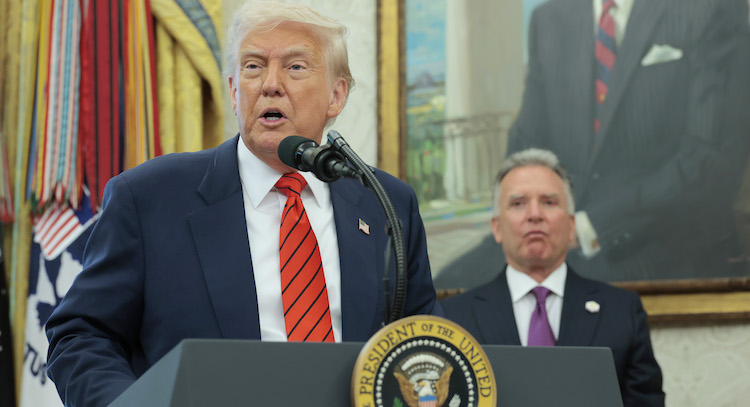Is the Trump administration leaving Israel behind? That’s the impression one gets from recent news stories.
Steve Witkoff, the president’s special envoy to the whole entire world, has been leaking to media and then commenting on his own leaks to the media. It’s a monologue billed as a conversation. And it has some Israelis worried.
According to Israel’s Channel 12, Witkoff is leveraging the hostage families as a political cudgel against Prime Minister Benjamin Netanyahu: “If until now the hostages have paid the price for the war not ending, today the price will be much heavier for Israel, and not just for the hostages,” he reportedly told the families. “President Trump is determined to move forward toward a significant deal with Saudi Arabia, even without Israeli involvement.”
Follow-up reporting from Haaretz found Witkoff debating with himself publicly: “The source told Haaretz that Witkoff’s criticism of the Israeli government was leaked at his request. Witkoff’s office denied that the administration is pressuring Israel to reach a deal.” So Witkoff is criticizing Israel, then making sure that criticism gets out to the press, then denying that he’s criticizing them at all. If Witkoff himself is also Haaretz’s source, he will have accomplished the rare feat of putting together a new Mideast Quartet consisting entirely of Steve Witkoff.
While we let the Steves work this out, we should note that this all came in the wake of President Trump declaring a unilateral-ish cease-fire with the Iran-backed Houthis. “They’ve announced to us at least that they don’t want to fight anymore,” he said, seemingly out of nowhere. “They just don’t want to fight, and we will honor that.” The Houthis “capitulated” and the Trump administration “will take their word. They say they will not be blowing up ships anymore.”
The truce, if it exists, appears to cover U.S. targets only. Today, the Houthis resumed their fire at Israel, though the missile was shot down by Israeli air defenses.
What has changed about the proposed U.S.-Saudi deal is unclear as well. The administration wants Israel to think it will no longer require Saudi recognition of Israel in return for a U.S.-aided civilian nuclear-power program. But the wording in the initial Reuters report is vague: “The United States is no longer demanding Saudi Arabia normalize ties with Israel as a condition for progress on civil nuclear cooperation talks, two sources with knowledge of the matter told Reuters ahead of U.S. President Donald Trump’s visit next week.”
Now come two more reports of muddled messaging, throwing even more confusion into the air right before Trump travels to the Mideast. Trump has talked tough about the prospect of an Iranian nuclear deal, all but saying that if a deal fails, the U.S. will do with force and fire what Iran won’t do on its own: dismantle its illicit program. After Witkoff initially seemed open to letting Iran enrich its own uranium (up to a point), which would reproduce one of the flaws of Obama-era policy, he backtracked. Secretary of State Marco Rubio echoed the backtrack: No enrichment should be allowed, none. On Tuesday, Trump reiterated that if Iran insists on trying to obtain a nuke, “it’s going to be a very sad thing, and it’s something we don’t want to have to do but we have no choice: they’re not going to have a nuclear weapon.”
But on Wednesday, when the president was asked if Iran could still have a civilian nuclear enrichment program, he responded: “We haven’t made that decision yet.”
And now the Wall Street Journal reports that nobody actually believes Trump’s declaration of a cease-fire with the Houthis: “We are not going back any time soon,” said Nils Haupt, a spokesman for a major German liner. “It’s a good development, but it needs a lot of security guarantees for the Red Sea to be considered safe for big merchant ships.” The Journal adds that the agreement “makes no clear mention of ending attacks on commercial shipping.”
The Defense Department seemed to acknowledge as much, telling reporters that there has been no official determination on what kind of naval escorts will be arranged to ensure the security of vessels traversing the Red Sea shipping lanes and surrounding area. Meanwhile, Houthi drones are still flying overhead. “It will take some time before the southern Red Sea is safe, and we are working on it,” a Pentagon official told the Journal.
Once a system is in place, moreover, it’ll likely take months, at the very least, of consistent security before major companies switch back to their old routes. In that period of time, anything can happen, including a failed Gaza cease-fire deal and the full resumption of the war.
At the same time, the president will be negotiating with Iran. How much will he be willing to crack down on Iranian proxies like the Houthis? If the Iranians need leverage during the talks, what’s to stop them from letting the Houthis fire away again to put pressure back on the U.S.?
On top of all that, Witkoff is playing with fire by using the hostage families to pressure Netanyahu, which will only introduce more tension and volatility into domestic Israeli politics—and who knows where that will lead, exactly? Not Witkoff. Or Witkoff. Or Witkoff or even Witkoff.
So it’s too soon to say Trump is leaving Israel behind. But it’s not too soon to say that his control over events is tenuous and his penchant for unpredictability often inspires the same in other parties, and therefore Israel should figure out how to end the war in Gaza on its own terms before anything else changes.


















